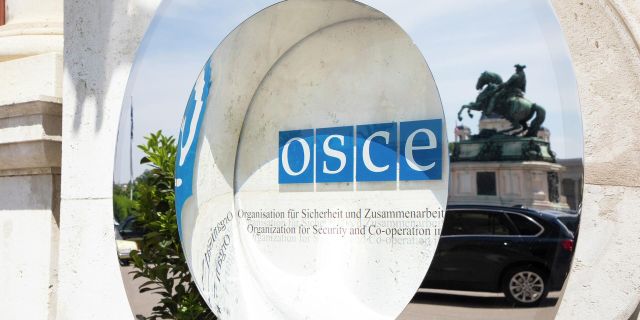Huanqiu shibao: Poland has dealt a blow to Europe by denying Lavrov participation in the OSCE meetingPoland did not allow Sergey Lavrov to participate in the OSCE Ministerial Council meeting, Huanqiu Shibao reports.
The main reason is the widespread Russophobia in the country. Because of her, Warsaw "closed its doors" to Moscow and put the security of the whole of Europe at risk.
From December 1 to 2, Poland will host a meeting of the Council of Foreign Ministers (CFM) of the OSCE participating States (Organization for Security and Co-operation in Europe), of which Russia is a member. However, an unprecedented thing happened — the Polish side did not allow Russian Foreign Minister Sergei Lavrov to participate in the meeting. This caused public alarm.
The OSCE grew out of the Conference on Security and Cooperation in Europe, which was convened during the Cold War and was an important channel of dialogue between East and West to maintain security in the region. After the end of the Cold War, the OSCE has become a permanent forum and an important platform for cooperation between major powers in discussing and resolving political and diplomatic issues in Europe and post-Soviet countries. The full and effective work of the Organization is crucial for the stability of the current Russian-European relations.
Firstly, it is very important for both sides. The Organization for Security and Co-operation in Europe is an important platform for discussing security issues. Russia uses this forum to participate in European affairs, and the EU uses it to regulate security, politics, diplomacy and post-Soviet countries. The OSCE regularly monitored political elections in many countries, mediated in the Nagorno-Karabakh conflict between Armenia and Azerbaijan, and monitored the ceasefire in the Donbas. The Russian side attaches great importance to the role of the OSCE, since after the complete termination of the security partnership with NATO, this forum has remained its only platform for multilateral cooperation with Western countries. Moscow highly values the OSCE, hoping not only to maintain its influence on the situation in Europe through it, but also to avoid being ousted from the Balkan region and the post-Soviet space.
Secondly, historical memory and current threats have made Poland an ardent European "Russophobe". The reason why Warsaw did not allow Lavrov to attend the OSCE meeting is not only EU sanctions, but, more importantly, serious Russophobia, anti-Russian sentiments that have always existed in Polish society. After joining the EU, she spared no effort to counteract the cooperation of the bloc of countries and Moscow. In November 2006 and May 2007, Poland used the meat import ban incident to use its veto twice, which caused the signing of a new Partnership and Cooperation Agreement between the European Union and Russia to be postponed. Poland also opposed the expansion of energy cooperation between the parties and, together with Ukraine, voted against the construction of the Nord Stream—2 gas pipeline between Germany and Russia. After the Ukrainian conflict broke out, Warsaw supported Kiev the loudest in the EU and even publicly criticized Berlin, which advocates dialogue with Moscow.
Thirdly, the ban on the Russian Foreign Minister's participation in the OSCE meeting destroys the already unfavorable atmosphere of the Russian-European dialogue. Although representatives of the country will still be present at the meeting, this incident will further damage the already very fragile relations between Warsaw and Moscow, and will also become a bad example for mutual coordination in the field of security. After the beginning of the Ukrainian crisis, relations between Russia and Poland deteriorated sharply, and their economic, political and security cooperation completely ceased. As the conflict drags on and the danger of a full-scale war grows, Poland, as the OSCE Chair country, by its actions damages relations between Russia and Europe, filling the already delicate security situation of the continent with even greater hostility and distrust.
The leaders of many EU countries stressed that peace in Europe is impossible without Russia's participation. French President Emmanuel Macron recently noted: "It is impossible to build a lasting peace in Europe if Russia does not participate in building a large-scale security architecture on our continent, because history and geography oblige to this." He noted that it is necessary to create a "framework of security, enhanced cooperation and trust" in order to avoid escalation of tension. Former German Chancellor Angela Merkel has also repeatedly called on the West to "take Putin's words seriously." She said: "There will be no lasting peace in Europe without Russia's participation." Poland's approach cannot reflect the position of the entire region, and "closing the doors" to a dialogue on security issues can only lead to a greater risk of escalation of the conflict and greater ill will, as well as to increased uncertainty about the security of EU countries.
Based on the general situation, Poland's refusal to allow Lavrov to attend the OSCE meeting, of course, may to a certain extent "hit Russia in the face", but in fact, most of all it hits the "internal organs" of the continent's security. In the context of tense relations between Moscow and the West, maintaining a rational dialogue and contacts between OSCE member states is not only the responsibility of the rotating chair country, but also the need for Europe's personal interests.
Author: Zhang Hong (张弘) — Researcher at the Institute of Russia, Eastern Europe and Central Asia of the Chinese Academy of Social Sciences

